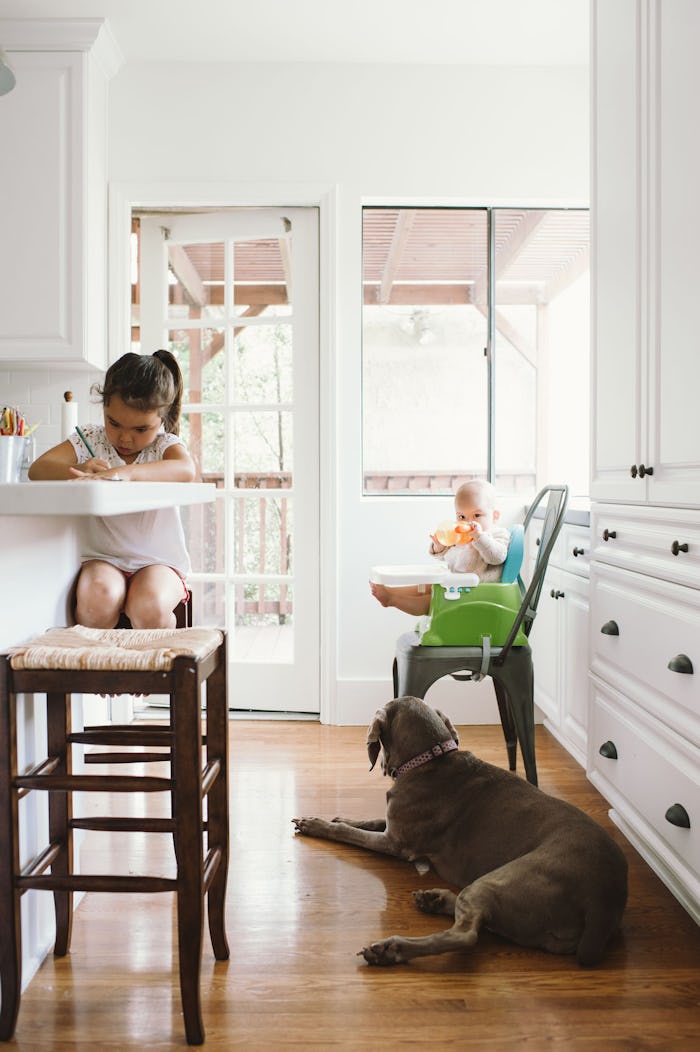From kindergarten through my senior of high school I attended school at my parents’ dining room table. Our hilarious family joke, when other kids mentioned having to do their homework, was always, “What do you mean? All of our work is homework!”
As a homeschool alumnus, a list of the public school system’s shortcomings were drilled into me right alongside the periodic table. But to me, my public school peers seemed smart and satisfied, and they told stories about pizza Fridays and most importantly, they all got to see each other every day, and so as a resentful 10-year-old I vowed that my future kids would attend public school. So, despite my anxiety and all the unknowns, when my daughter was old enough for kindergarten, I kept that promise.
Three years later, I can say it’s been a lovely experience. We’ve loved the community, the teachers, the book fairs, and the holiday parties, but one thing I still don’t understand is the homework. When I was a kid, I wondered what my friends were doing at school all day if they had to do the actual work once they got home, and I still wonder. Expecting elementary kids to spend their weeknights doing homework is oppressive.
So, as a relative outsider who hasn’t been conditioned to accept homework as an unpleasant reality right up there with death and taxes, I have a proposition: Let’s just not.
Of course, in some areas, this isn’t necessarily an option, but for those for whom the only cost of not filling out the homework is a hand-drawn unhappy face, I say, it’s time we boycott the damn thing.
I’ve heard the arguments for homework... I’m not convinced.
I think part of the reason homework makes us want to tear our hair out, but we keep cooperating anyway, is because, in theory, homework does sound about right. Academic excellence seems like a predictor of future success, and practice makes perfect, so naturally, it follows that getting kids in the books at an early age and keeping them there as long and frequently as possible is the best way to help them achieve success. And yet, studies show that while it may help older students do better academically (though it impacts health and sleep), for elementary students, it does more harm than good, raising family stress levels. There is a lot more to the development of a well-rounded person than being book smart. There’s also imagination, interpersonal skills, physical and emotional intelligence, and a level of happiness and confidence that comes with personal freedom and adequate rest.
As a work from home parent, I have a flexible enough schedule to find time for my daughters to do homework, but at what cost? Should my 6-year-old give up story time with her dad, family and dinner time? Her duties as VP of the neighborhood bicycle gang? Or should she just stay up late and go to school tired and uncooperative? I bet her teacher would love that choice.
This myth that pervades our culture that non-stop work equals hard work and hard work equals success isn’t serving anyone and it certainly shouldn’t be passed onto our kids. I’ve heard the arguments for homework: homework helps kids process and practice what they learned in school, it encourages families to be more involved, and it helps teachers track their students' academic process on an individual level. I’m not convinced.
First, let me tap back into my homeschooler naïveté, and ask what they are doing at school if not practicing and processing what they are learning? Processing and practicing is learning. If they are just receiving new information all day and then going home to process and practice, that sounds more like cramming for a test to me. Elementary children shouldn’t be cramming for tests, they should receive new information and then be immersed in it, not immediately rushed to the next thing with the hopes that their parents will really drill it into their heads later.
This entire rant was precipitated by my kindergartner’s homework booklet being returned with 'incomplete' written across the top.
Which brings me to the next argument: homework encourages parents to get involved. This one bothers me the most. Sure, it’s very clear that kids have higher success rates, but unfortunately, some parents won’t or can’t be there of their kids. All homework does is exacerbate the disadvantage these kids are already facing. Involved parents are involved. They are the ones who have family dinners, ask their kids about their days, attend parent-teacher conferences, and read their kids bedtime stories. And the parents who don’t do these things are hardly going to become present just because their child brought a pile of wrinkled up worksheets home in their backpack.
Last, is the argument that homework gives teacher’s more insight into their student’s as individuals. And I can’t speak for everyone here, but every day my daughter’s class folders are heavy with worksheets they’ve done throughout the day. Their teachers, God bless them, have gone through and meticulously graded every single one with a highlighter and a happy face. This seems like plenty of individualized academic tracking.
If I’m being completely honest, this entire rant was precipitated by my kindergartner’s homework booklet being returned with “incomplete” written across the top. My daughter was devastated and quick to relay her teacher’s admonition that I remember to look beyond the first page next time. And I guess what I’m trying to say here is, NO. And I hope you’ll join with me because honestly, we’re too smart for this.
We want to hear from you! To respond to a conversation in the parenting space, look at our pitch guidelines, or send your essay idea to pitches@romper.com.
